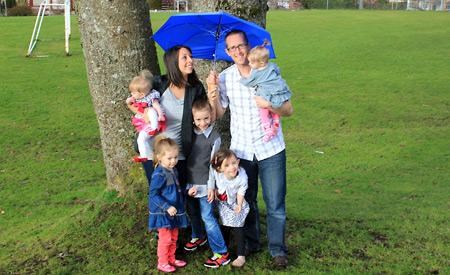Despite the success of a multimillion dollar publishing industry for parenting books, babies still do not come with a manual.
But even if they did, it probably would not be as helpful as most parents would want. As all veteran moms and dads can attest to, each child is different. And by the time any usable manual is complete, it will not be necessary anymore.
Parents Matthew and Ashley Hull know this reality better than most.
The Peak decided, with Father’s Day coming up, to sit down and chat with Matthew about his parenting philosophy and gain a glimpse into his family life.
The Hull family is quite large by contemporary standards. About two years separate each of the family’s first three children: Ethan is eight, Sariah is six and Claire is four. Twins Gianna and Genevieve will be two at the end of June.
“The difference between three and five, other than noise level, is you’re still outnumbered,” said Matthew.
Children share rooms in their home and the family has a minivan for transportation. Logistically, vacations are challenging and can be expensive, particularly when hotels insist on a maximum of four to a room, he added.
Matthew and Ashely did not set out to have a family so large. Having that many people in a house is something that Matthew said he is used to as he is one of his parents’ five children. “For me a big family was not a big deal. It is pretty normal. I didn’t know I’d have five, but it never seemed out of the question.”
According to Statistics Canada, the Hull family is something of an outlier. The average number of children per family decreased from 2.7 in 1961 to 1.9 in 2011. During the same period, the average number of people per family declined from 3.9 in 1961 to 2.9 in 2011. But while family size declined over the period, the number of households increased.
“I’m not a perfect dad, and I’m learning that one,” said Matthew sitting in the sunshine outside of a local coffee shop. “There’s a lot of times when I fail and I’m not happy with the things that I do.” A big part of parenting for him is modelling behaviour that he would like to see his children adopt.
“I have learned to apologize to my kids so they know I’ve made a mistake,” he said, “and then we move on from there.”
He said that despite not being “a perfect dad,” he knows the times when his children need him and they are his first priority. With five children that means there are five different parenting styles, Matthew said. “None of them have worked with all the kids. And even with some [of the children] the parenting style is different on Monday than it is on Tuesday. I have good kids and I’m really thankful for [them], but sometimes the meltdowns can be pretty epic on any given day.”
Despite those challenges, he said that his children have helped shape him as the person he is and he could not imagine his life without them.
There may not be a parenting manual, but Matthew said that one of the most important things he thinks for new dads to recognize is that being a good father amounts to being able to communicate with their children, getting to know each one of them and cherishing the limited time they have to spend with their children when they are young.
Matthew said that he and Ashley work around flexible schedules to make sure that each has time to do things needed to be done. In addition to their work and volunteering, both are involved with Bollywood dancing. “We have a lot of fun doing that,” he said. “We find ways to enjoy life, not just cope.”
Matthew said he is looking forward to Father’s Day this year and though he is not sure what is in store, he hopes to spend the day with his family at the beach.



